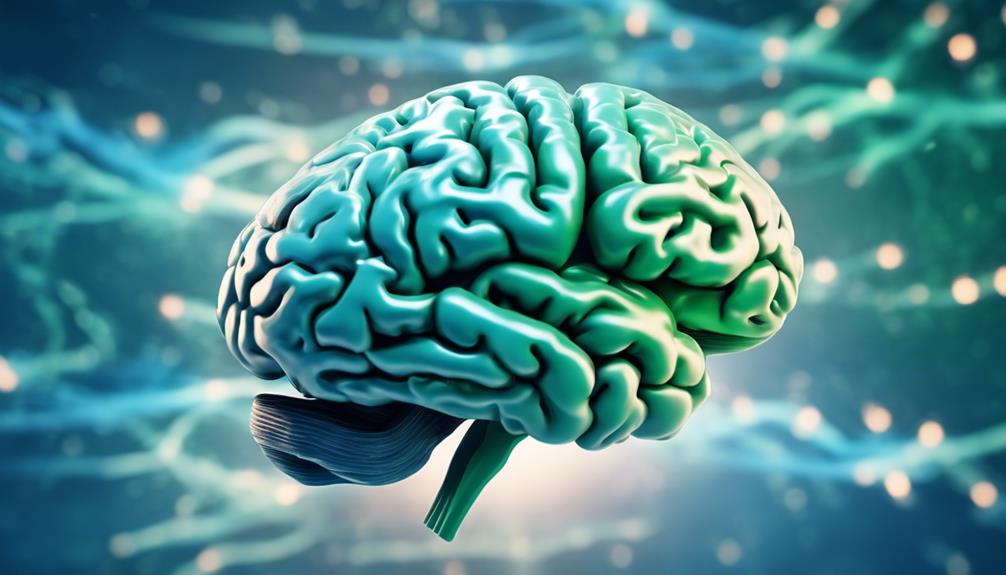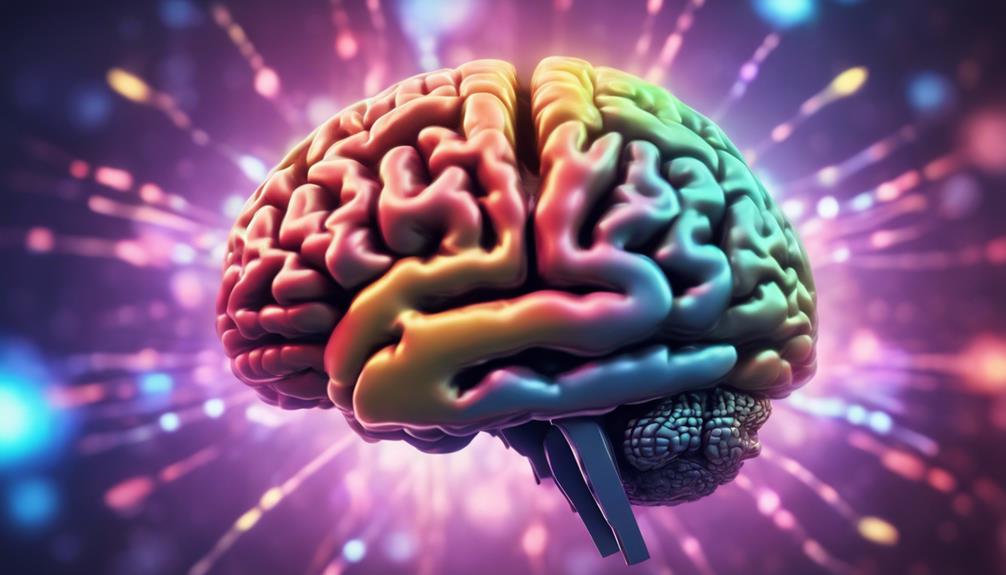
Balanced brainwaves are key for mental health. They ease anxiety, boost focus, and enhance emotional control. Increased alpha waves lower anxiety levels and trigger relaxation. Sharpened cognitive skills and clearer decision-making stem from balanced brainwaves. Regulating brain waves through meditation and breathing curbs stress and promotes deep sleep. Handling situations better and staying calm are benefits of brainwave balance. Techniques like music and visualization aid in achieving this balance. Understanding brainwave frequencies reveals their significance in emotional stability and cognitive function. Delve deeper to reveal the full potential of balanced brainwaves.
Understanding Brainwave Frequencies
Discover the fascinating realm of brainwave frequencies to unveil the enigmas of your mind's potential for peak mental health and well-being. Your brain operates at different frequencies, each serving a unique purpose in your mental wellness.
Delta brainwaves, ranging from 0.5 to 3 Hz, are vital during deep meditation and dreamless sleep, allowing for restorative rest and healing. Moving up the spectrum, theta brainwaves, between 3 to 8 Hz, cultivate dreamy, detached unconscious thoughts, enhancing creativity while reducing stress levels.
Progressing higher, alpha brainwaves (8 to 12 Hz) accompany meditative and mindful activities, promoting relaxation and stress reduction. Beta brainwaves (12 to 38 Hz) come into play during problem-solving and focused mental tasks, aiding in concentration and cognitive functions.
Impact of Balanced Brainwaves on Anxiety
In the domain of mental wellness, finding a balance in your brainwaves, particularly with increased alpha waves, can be a powerful tool in reducing anxiety and cultivating a sense of calmness. Alpha waves, known for their association with relaxation, play a pivotal role in alleviating symptoms of anxiety disorders.
By regulating your brain waves, perhaps through practices like meditation, you can effectively manage and decrease feelings of anxiety. Studies have shown that heightened alpha wave activity correlates with enhanced emotional regulation and a decrease in anxiety responses.
When you achieve a state of balanced brainwaves, including ideal levels of alpha waves, you may experience a significant reduction in anxious thoughts and feelings. Embracing techniques that promote the presence of alpha waves in your brain can lead you towards a path of improved emotional well-being and a greater sense of peace within yourself.
Trust in the power of balanced brainwaves to help you navigate through moments of anxiety and find tranquility.
Enhancing Cognitive Function With Balanced Brainwaves

Curious about how balanced brainwaves can enhance your cognitive function and boost your mental abilities? When your brainwaves are in harmony, incredible things happen. Here's how balanced brainwaves can elevate your cognitive function:
- Sharper Focus: Balanced brainwaves help sharpen your focus, allowing you to concentrate better on tasks at hand.
- Enhanced Memory: Peak brainwave balance boosts memory retention, making it easier to recall information when needed.
- Improved Problem-Solving: With balanced brainwaves, your problem-solving skills become more efficient and effective.
- Increased Mental Clarity: Achieving brainwave balance leads to enhanced mental clarity, enabling you to think more clearly and make better decisions.
Improving Emotional Regulation Through Brainwave Balance
Achieving emotional regulation through balanced brainwaves is a transformative practice that can greatly enhance your well-being and mental health. By regulating brainwave patterns, you have the power to reduce stress levels and anxiety, leading to improved emotional stability. When your brainwaves are balanced, you're better equipped to manage your responses to various situations, promoting a sense of calm and control. This balance not only enhances your emotional regulation but also contributes to better sleep quality and overall relaxation.
When your brainwaves are in harmony, your mood stability and emotional well-being are positively influenced. This, additionally, can have a profound impact on your stress levels, allowing you to navigate challenging circumstances with greater resilience. Additionally, balanced brainwaves support cognitive function and mental clarity, providing a strong foundation for improved mental health. Techniques like neurofeedback can aid you in achieving this balance, empowering you to manage your emotions effectively and enhance your overall quality of life.
Techniques for Achieving Balanced Brainwaves

To enhance your mental well-being and achieve balanced brainwaves, consider incorporating various techniques that promote relaxation and cognitive clarity. Here are some effective methods to help you regulate your brainwave activity, improve mental states, and reduce stress:
- Meditation: Engage in meditation practices to increase alpha and theta brain waves, fostering relaxation and boosting creativity.
- Deep Breathing Exercises: Practice deep breathing techniques to regulate theta and delta waves, aiding in stress reduction and promoting deep sleep.
- Music Therapy: Listen to music to alter brain wave patterns, influencing your mental states and emotions positively.
- Visualization: Utilize visualization techniques to impact alpha waves, enhancing relaxation and focus in your daily life.
Frequently Asked Questions
What Are the Benefits of Brainwave Therapy?
When you explore the benefits of brainwave therapy, you discover a world of possibilities. From reducing stress and anxiety to boosting cognitive performance and enhancing problem-solving skills, this therapy is a game-changer.
It promotes relaxation, creativity, and better sleep, aiding in managing anxiety and depression symptoms. By balancing brainwaves, you pave the way for improved mental well-being and cognitive functioning.
Embrace the power of brainwave therapy for a brighter tomorrow.
What Brain Waves Are Involved in Mental Activity?
When it comes to mental activity, various brainwaves come into play.
Beta waves are key for active thinking, while alpha waves support mindful activities.
Theta waves contribute to dreamy unconscious thoughts, and gamma waves enhance focus.
Delta waves play a role in deep meditation and dreamless sleep.
Understanding these brainwave functions can help you optimize your mental processes and improve overall well-being.
What Brain Waves Promote Healing?
When it comes to promoting healing, delta waves are your brain's unsung heroes. Ranging from 0.5 to 3 Hz, these slow brain waves work wonders during deep sleep, aiding in physical recovery and rejuvenation. They play a crucial role in repairing tissues and enhancing overall well-being.
What Brainwave Is Best for Problem-Solving?
When it comes to problem-solving, beta brainwaves are your go-to! These brainwaves, ranging from 12 to 38 Hz, are perfect for tasks that require focus and active thinking.
They're your cognitive heroes, boosting critical thinking skills and mental clarity.
Conclusion
As you journey towards balanced brainwaves, remember that you hold the key to accessing a world of mental wellness and clarity.
Like a conductor orchestrating a symphony, your brainwaves harmonize to create a masterpiece of peace and harmony within.
Embrace the power within you to nurture balance and watch as your mental health blossoms like a garden in full bloom.
Trust in the process and know that a brighter tomorrow awaits you.

